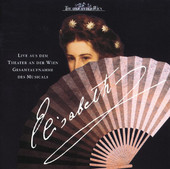Elisabeth (musical)
| Elisabeth | |
|---|---|
 |
|
| Music | Sylvester Levay |
| Lyrics | Michael Kunze |
| Book | Michael Kunze |
| Basis | The life of Empress Elisabeth of Austria |
| Productions | 1992 Vienna 1996 Takarazuka Revue 1996 Tokyo 1996 Budapest 1999 The Hague 1999 Karlstad 2000 Tokyo Revival 2001 Essen 2003 Vienna Revival 2005 Turku 2005 Stuttgart 2007 Japanese Tour 2006 Thun 2008 Berlin 2008 European Tour 2012 Seoul 2012 Osaka 2012 Seoul 2012 Vienna revival 2013 Korean Tour 2014 Shanghai 2015 Seoul 2015-16 European Tour |
Elisabeth is a Viennese, German-language musical commissioned by the Vereinigte Bühnen Wien (VBW), with book/lyrics by Michael Kunze and music by Sylvester Levay. It portrays the life and death of Empress Elisabeth of Austria, wife of Emperor Franz Joseph I. It has been translated into seven languages and seen by over ten million spectators worldwide, making it the most successful German-language musical of all time.
The musical tells the story of Elisabeth ("Sisi"), the Empress of Austria, from her engagement and marriage in 1854 to her murder in 1898 at the hands of the Italian anarchist Luigi Lucheni, through the lens of her growing obsession with Death as her marriage and her empire crumble around her at the turn of the century.
The show opens in the "nightly world of the dead and the dreamers", where Luigi Lucheni is being interrogated by a Judge as to why he has murdered the Empress Elisabeth. Lucheni claims that he did no more than what Elisabeth herself wanted, since all her life Elisabeth has been in love with Death himself - and vice versa. As his witnesses, Lucheni brings back the dead aristocracy of the bygone era and takes us to the past, where he serves as a sarcastic narrator of the events that lead to the transformation of the sweet and innocent Sisi to the revered and infamous Elisabeth, Empress of Austria and Hungary, and her decline through later years until her assassination.
At a young age, Sisi, grown up in a seemingly sorrowless environment, experiences her first encounter with Death, which launches a love-hate affair that will span her entire life. Lucheni claims that once Franz Joseph, the Emperor of Austria, picks Elisabeth as his bride - for once opposing his domineering mother Sophie - he begins a chain of events that will eventually topple the Habsburg empire. Elisabeth herself very soon comes to regret her seemingly "fairy-tale marriage" as the biggest mistake of her life. She feels abandoned by her careless husband, psychologically abused by her possessive mother-in-law and is chronically depressed due to her loneliness. There is only one thing that keeps her emotionally stimulated—the dark and sensual shadow of Death; but Elisabeth is reluctant to consummate their relationship. When Death takes her infant daughter, the tragedy shakes the young Empress extremely, but she refuses to give in to Death's sway. After her other two children, including her only son Rudolf, are taken away by Sophie, Elisabeth calluses over and becomes a cold, selfish woman. She flees the Austrian court and spends decades restlessly travelling all over the world, trying in vain to escape from her fear of emptiness. Eventually, Elisabeth makes peace with her husband and finds new meaning in her life when she helps unify Austria and Hungary, but her newfound purpose makes her neglect her psychologically delicate son even further, sending young Rudolf into deep depression and causing him to bond with Death.
...
Wikipedia
